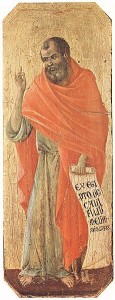Hosea 11:1-11
This text is used for the Lectionary Year C on July 31, 2016.

For most of Hosea chapters 1-10, Israel has heard of her apostasy and rebellion against the Lord. These charges include judgment and pending punishment. Hosea 11 departs from this cycle, offering a statement of God’s love for the people and a promise of future restoration.
For those concerned with the patriarchal language from Hosea 1 last week, the imagery moves from one of marriage between man (God) and woman (Israel)—made incarnate through Hosea and Gomer—to the metaphor of a parent (God) and child (Israel). The language surrounding this picture, particularly in the first section of verses 1-4, invites consideration of God as a mother who nurtures and cares for the young. Within the male dominated society of ancient Israel, women had the tasks of child-rearing. In this way, God mothers Israel out of infancy to maturation. As any parent of adult children knows, once the kids are able to make their own decisions, they don’t always make the right, or righteous, ones.
Lest we forget, Hosea is the father of Jezreel, Lo-Ruhammah and Lo-Ammi. The reader may hear his own vexation as a parent of rebellious children in these opening verses. These I-statements reveal a parent in pain and anguish, receiving apathy and hostility for the offering of love and care. God nurtured Israel only to have Israel lay its affection upon idols and false gods. The prophetic words do not arise from anger but from longing and disregarded love.
